A resumption of military clashes in the Libyan city of Sirte this week came as deputies loyal to the Government of National Accord launched a new political initiative that rejects any role for Libyan National Army (LNA) commander Khalifa Haftar in the political process.
Asaad Shartaa, spokesman for a council formed by defected members of the Libyan parliament, said during a press conference Tuesday that the initiative seeks to achieve a comprehensive national reconciliation on condition that those who have committed crimes against Libyans would not go unpunished.
On the battlefield, the GNA forces revealed no movements at Wadi Bai, which is deemed a strategic region on the Sirte and Jufra line. However, a military source reported to pro-LNA Libyan Arab News Agency (LANA) that the army conducted aerial sorties against “hostile targets” in Wadi Bai and Abu Nujaym, southeast of Misrata.
Remarkably, Minister of Interior of the Libyan Interim Government Ibrahim Bushnaf ordered the General Administration of Central Support to secure the city.
This came after Chairman of the Energy and Natural Resources Committee of the Libyan House of Representatives (HoR) Issa al-Oraibi approved a proposal made by Speaker of the east-based Libyan parliament Aguila Saleh to place Sirte under the protection of the Ministry of Interior.
Further, Libyan Foreign Minister Mohamed Sayala held discussions with Italian Ambassador to Libya Giuseppe Buccino on the possibility of activating the Libyan-Italian treaties and the issue of migrants.
The meeting mainly dealt with Libyan-Italian treaties, particularly with regard to the highway linking Ras Ajdir and Musaid.
In a related development, the International Organization for Migration (IOM) announced that 141 migrants were intercepted at sea and taken back to Libya.
Migrants intercepted at sea by the Libyan coast guard in 2020 numbered 6,989, IOM said, while 123 died and 180 went missing.









